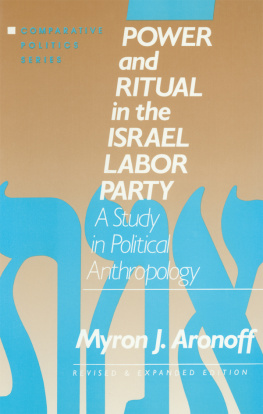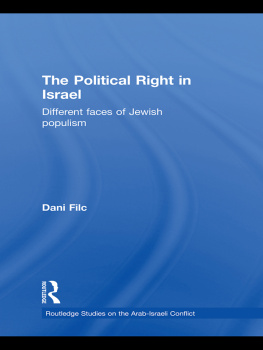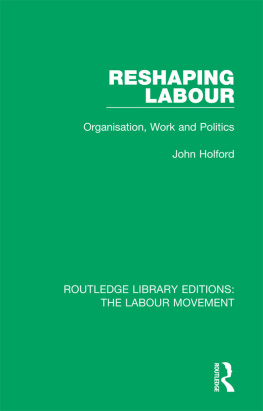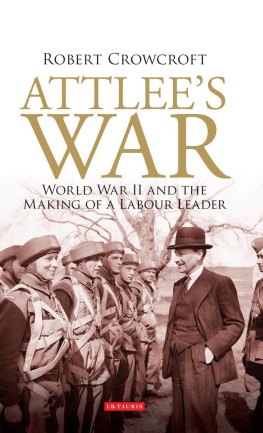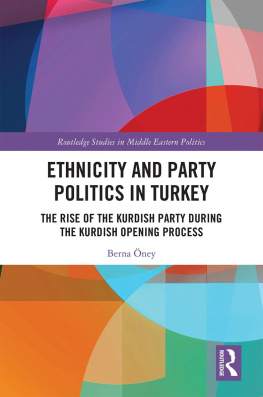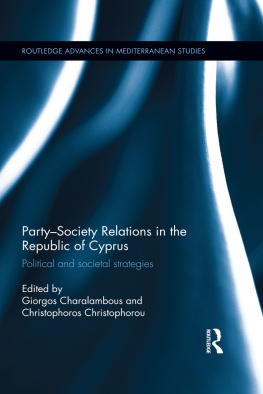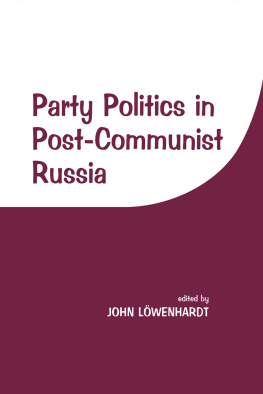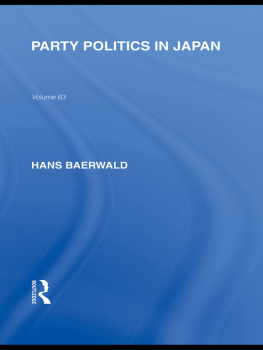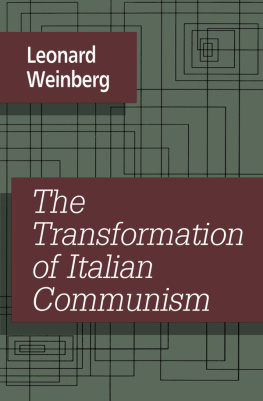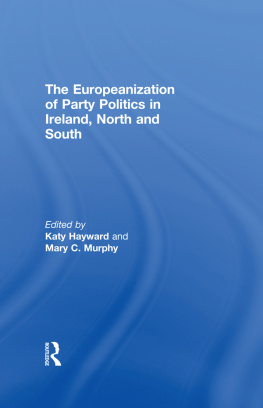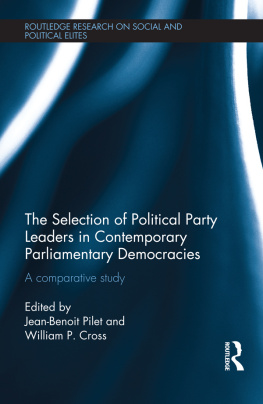POWER
and
RITUAL
in the
ISRAEL
LABOR
PARTY
A Study
in Political
Anthropology
First published 1993 by M.E. Sharpe
published 2015 by Routledge
2 Park Square, Milton Park, Abingdon, Oxon OX14 4RN
711 Third Avenue, New York, NY 10017, USA
Routledge is an imprint of the Taylor & Francis Group, an informa business
Copyright 1993 Myron J. Aronoff & Francis. All rights reserved.
No part of this book may be reprinted or reproduced or utilised in any form or by any electronic, mechanical, or other means, now known or hereafter invented, including photocopying and recording, or in any information storage or retrieval system, without permission in writing from the publishers.
Notices
No responsibility is assumed by the publisher for any injury and/or damage to persons or property as a matter of products liability, negligence or otherwise, or from any use of operation of any methods, products, instructions or ideas contained in the material herein.
Practitioners and researchers must always rely on their own experience and knowledge in evaluating and using any information, methods, compounds, or experiments described herein. In using such information or methods they should be mindful of their own safety and the safety of others, including parties for whom they have a professional responsibility.
Product or corporate names may be trademarks or registered trademarks, and are used only for identification and explanation without intent to infringe.
Library of Congress Cataloging-in-Publication Data
Aronoff, Myron Joel.
Power and ritual in the Israel Labor Party:
a study in political anthropology /
by Myron J. Aronoff.Rev. and expanded ed.
p. cm.(Comparative politics)
Includes bibliographical references and index.
ISBN 1-56324-105-6 (cloth)
ISBN 1-56324-106-4 (pbk.)
1. Mifleget ha- avodah ha-Yire elit.
2. IsraelPolitics and government.
I. Title.
II. Series: Comparative politics (Oxford, England)
JQ1825.P373A76 1992
324.2569407dc20
92-13466
CIP
ISBN 13: 9781563241062 (pbk)
ISBN 13: 9781563241055 (hbk)
For Rebecca C. Aronoff and in memory of Harry J. Aronoff
To judge from publishers announcements and recent political science journals, a comparative approach to the study of political science is both widely accepted and widely practiced today. There is, however, a debate over the exact nature of the comparative aspect of such an approach, concerning whether this comparative approach is a broad method of analysis or rather a general perspective on a certain subject matter.
This debate has led to two very different kinds of studies being subsumed under the general category of comparative politics. The first is explicitly comparative in method and is often referred to as cross-national analysis. This type of study might focus on, for example, legislatures or interest groups in several settings, and seek to discover and explain similarities and differences across ethnic, regional, or national lines. The second type of study can be referred to as being comparative in perspective, sometimes referred to as case study analysis. It might focus on political behavior or political institutions in one setting, with the idea that by studying these in some detail the study will draw, either explicitly or implicitly, some lessons for students of political behavior or political institutions in other settings.
Given that the numbers of studies following each approach are quite extensive (indeed, many scholars have utilized both approaches, sometimes even in the same study), it would be inappropriate to say that one of these two types of comparative study is better, or preferable, to the other. Rather, we should note that just as the general approaches are different, so too are the kinds of conclusions that we can draw from each type of study. Cross-national analysis may provide us with more opportunity to engage in explicit comparison from one setting to another, but it does not provide the depth and degree of detail provided in the case study analysis.
This volume is an outstanding example of the latter approach. As Myron Aronoff notes in his preface, the first edition of this book was published in 1977, when Israel constituted a different political world from the Israel of today. This book was very favorably received when it first appeared, both because of its approachthe anthropological study of a major national political party was truly groundbreakingand because of the clarity of the analytical perspective it pre-sented.
Aronoffs approach in his original work was broadly comparative, and the new, expanded edition is explicitly comparative across time, examining the Labor Party from a pre-1977 perspective and again from several different perspectives in the ensuing fifteen years. This volume is an example of an exciting, important, and, indeed, definitive work on the development of a political party in a unique nation-state.
This book is the first publication in M.E. Sharpes series in Comparative Politics. The series intends to make available studies that focus on a wide range of political institutions and political behaviors, studies that are comparative in the broadest sense of the term. We expect that forthcoming volumes in the series will follow both the cross-national approach to comparative politics and the case study approach. We hope you find this first work and its future companions stimulating and instructive.
Gregory S. Mahler
Preface to the Revised
and Expanded Edition
Plus a change, plus cest la mme chose.
Just as the first edition of this book was published in 1977, prior to Labors historic first defeat in that years national election, this edition goes to press on the eve of its return to power as a result of victory in the 1992 Knesset election. Although the completed manuscript for the first edition was in the publishers hands by June 1975, the analysis anticipated Labors defeat by explaining how the party and its leadership had become increasingly unresponsive to the dynamically changing society and had thereby lost their authority. For this expanded edition, four new chapters have been added to the original nine chapters of the first edition..
The new The transition from a dominant party to a competitive party system was as difficult for the Likud, the leaders of which in certain respects continued to act as if they were still in the opposition, as it was for Labor, whose leaders continued to act as if they were entitled to govern the nation. As Moshe Carmel (former transport minister and a Labor Knesset member for five terms) observed at the time of the Labor Party national convention in November 1991,
Labors greatest problem is that it cannot come to terms with being in the opposition. Somehow, subconsciously, it still regards itself as the party to which power naturally belongs. For many years, it was accustomed to running things and determining the fate of the nation, and it cant accept or come to grips with anything different.3
Labors leaders never fully understood nor drew the proper conclusions as to why they had lost the publics trust and confidence. Their symbolic gestures toward reform were too little and too late. The one major area in which significant progress has taken place, albeit belatedly, is in opening up the process through which the partys candidates to the Knesset are selected. This led to the election of more attractive and representative lists of candidates for the 1988 and the 1992 elections. These reforms are analyzed in One such reform was the major decision to have the Knesset candidates, including the partys top leader, who is its candidate for the premiership, selected in national and regional primary elections by the dues-paying members of the party.

